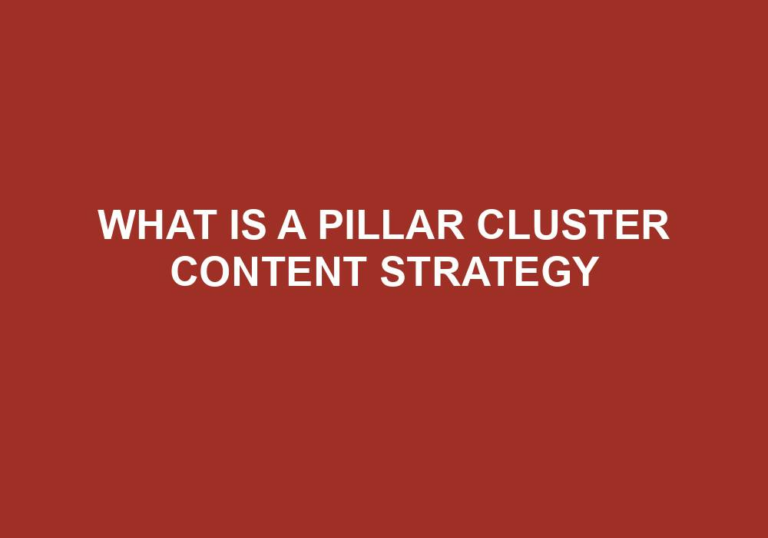Picture this: you’re navigating the vast online landscape, searching for information, products, or simply trying to connect with others. What if I told you there’s a new paradigm on the horizon that’s set to revolutionize your online experience? Enter the ChatGPT paradigm, a cutting-edge technology that promises to reshape the way we interact with websites and search engines.
In this article, we’ll explore the future role of the ChatGPT paradigm in the world of SEO. You might be wondering, what exactly is ChatGPT? Well, imagine having a virtual assistant that can understand your queries just like a human, delivering personalized responses in real-time. That’s the power of ChatGPT!
So how does this relate to SEO? Fasten your seatbelt because the ChatGPT paradigm has the potential to transform how websites are optimized for search engines, making it easier for users like you to find what you’re looking for. Exciting, right? Join us as we delve into the incredible potential and future possibilities of ChatGPT in the realm of SEO. Let’s dive in!
The ChatGPT Paradigm: Its Future Role in SEO
Welcome to the future of SEO! In this article, we will explore the role of the ChatGPT paradigm in shaping the future of search engine optimization. ChatGPT, developed by OpenAI, is a powerful language model that utilizes artificial intelligence to generate human-like text. With its ability to understand and respond to natural language, ChatGPT has the potential to revolutionize the way websites are optimized for search engines. Join us as we delve into the intricacies of the ChatGPT paradigm and its implications for the SEO landscape.
Understanding the ChatGPT Paradigm
Before diving into its future role in SEO, it is essential to understand the ChatGPT paradigm. ChatGPT is based on a deep learning model called Transformer, which enables it to process and generate text. It has been trained on a vast amount of data to become proficient in understanding and generating human-like responses. The model takes a prompt or a user’s input and generates a contextual, coherent, and relevant response. ChatGPT’s capabilities extend to various domains, including answering questions, creating conversational agents, providing assistance on a range of topics, and even generating code snippets.
ChatGPT utilizes an attention mechanism to process and understand textual information effectively. This mechanism allows the model to assign different levels of importance to different parts of the text, focusing on the most relevant information. This attention to detail enables ChatGPT to generate coherent and contextually accurate responses. The model thrives on both structured and unstructured inputs, making it suitable for a wide range of applications, including SEO.
To ensure the highest quality response, OpenAI fine-tuned ChatGPT using Reinforcement Learning from Human Feedback (RLHF). Human AI trainers provided conversations where they acted as both the user and the AI assistant, and this dataset was combined with the InstructGPT dataset. This iterative training process helped improve the model’s performance over time and made it safer and more reliable.
Benefits of Incorporating the ChatGPT Paradigm in SEO
The ChatGPT paradigm holds great potential for enhancing SEO strategies and practices. Let’s take a look at some of the benefits that incorporating ChatGPT can bring to website optimization:
1. Rich and Engaging Content:
ChatGPT can generate high-quality content that is relevant, unique, and engaging. It can aid in creating valuable blog posts, product descriptions, landing page copy, and other types of content that search engines love. By leveraging the power of ChatGPT, SEO professionals can produce content that captivates readers and drives organic traffic to their websites.
Moreover, ChatGPT can help optimize existing content by providing suggestions for improvements such as rephrasing sentences, adding relevant information, or incorporating trending keywords. This can boost the visibility of webpages in search engine result pages and improve overall SEO performance.
2. Enhanced User Experience:
User experience is a key factor in SEO, and ChatGPT can contribute significantly to improving it. By incorporating ChatGPT-powered chatbots or virtual assistants on websites, businesses can provide instant and personalized responses to users’ queries. This enhances the overall user experience and helps in driving customer satisfaction and engagement.
ChatGPT can understand and respond to complex natural language queries, providing accurate and relevant information to users. It can assist in guiding users through websites, suggesting relevant products or services, and even helping with troubleshooting and issue resolution. These personalized interactions create a positive user experience, leading to increased user retention and improved SEO performance.
3. Efficient Keyword Research:
Keyword research is a fundamental aspect of SEO, and ChatGPT can streamline this process. By providing a keyword or a topic to ChatGPT, businesses can receive a list of relevant and highly-ranked keywords. This saves time and effort in manually researching keywords and allows SEO professionals to focus on other strategic aspects of optimization.
Moreover, ChatGPT can identify emerging trends and popular search queries, enabling businesses to adapt their content strategy accordingly. Staying ahead of the curve in terms of trending keywords can lead to higher visibility and improved search engine rankings.
Implementing ChatGPT for SEO Success
Now that we have explored the benefits of incorporating the ChatGPT paradigm in SEO, let’s delve into some tips for implementing it effectively:
1. Identify Strategic Areas for ChatGPT Integration:
Start by identifying the areas of your website or SEO strategy where ChatGPT can make the most significant impact. This could include incorporating chatbots on landing pages, optimizing content generation, or enhancing user experience through personalized responses. Identifying these strategic areas will help you prioritize and allocate resources accordingly.
a. Chatbots:
Integrating chatbots powered by ChatGPT can help businesses provide instant support to website visitors. These chatbots can respond to user queries, offer recommendations, and guide users through the purchasing process. Consider implementing chatbots on high-traffic pages or those that often receive customer inquiries.
b. Content Generation:
Utilize ChatGPT to generate fresh, engaging, and optimized content for your website. Leverage the model’s capabilities to create blog posts, product descriptions, and meta tags that align with SEO best practices. Ensure that the content generated by ChatGPT passes through a review process to maintain quality and consistency.
2. Fine-tune Responses:
As with any AI-powered system, it is crucial to fine-tune ChatGPT’s responses to ensure accuracy and relevancy. Continuously review and improve the responses generated by the model to meet your specific SEO goals. By providing feedback and incorporating user interactions, you can refine the system to provide better results over time.
a. Human Oversight:
Even though ChatGPT is trained on a vast amount of data, human oversight is essential to ensure the accuracy and appropriateness of its responses. Monitor and moderate the AI-generated content to maintain a high standard and prevent any potential issues that may arise due to the model’s limitations.
b. User Feedback:
Actively encourage user feedback on the responses generated by ChatGPT. This feedback can help identify areas for improvement and tailor the responses to meet user expectations. Incorporate user suggestions and preferences to create a personalized and user-oriented experience.
3. Keep Up with Updates and Improvements:
The field of AI is rapidly evolving, and so is ChatGPT. Stay up to date with the latest advancements and improvements in the model to ensure that your implementation remains effective. OpenAI frequently releases updates and new versions of ChatGPT, which may introduce enhanced capabilities and improvements in response quality.
a. Stay Informed:
Follow OpenAI’s updates and announcements to stay informed about new releases and features. This will allow you to leverage the most up-to-date version of ChatGPT and take advantage of any performance-enhancing improvements.
b. Refine and Adapt:
Continuously refine and adapt your implementation strategy based on the feedback and data you gather. Embrace a data-driven approach to understand the impact of ChatGPT on your SEO performance and make necessary adjustments to achieve the best results.
Summary
The ChatGPT paradigm has the potential to revolutionize SEO practices, providing businesses with enhanced content generation, improved user experience, and efficient keyword research. By embracing ChatGPT, SEO professionals can create rich and engaging content, deliver personalized user experiences, and optimize their website for maximum visibility and search engine ranking. With careful implementation and fine-tuning, ChatGPT can become a valuable tool to boost SEO success in the ever-evolving digital landscape.
Key Takeaways: The ChatGPT Paradigm – Its Future Role in SEO
- ChatGPT is an innovative AI model that has the potential to revolutionize SEO.
- By understanding natural language queries, ChatGPT can produce accurate and relevant search results.
- ChatGPT’s conversational tone makes it engaging and suitable for voice search optimization.
- This paradigm shift will require SEO professionals to adapt their strategies to leverage the power of ChatGPT.
- Integrating ChatGPT in SEO efforts can enhance user experience and drive higher organic traffic.
Frequently Asked Questions
The ChatGPT paradigm is revolutionizing the field of SEO. Here are some frequently asked questions about its future role in SEO.
1. How does ChatGPT impact search engine optimization?
ChatGPT, with its advanced language generation capabilities, can greatly impact search engine optimization. By using ChatGPT, content creators can generate high-quality, engaging content that is optimized for search engines. ChatGPT can help in keyword research, content creation, and even optimizing meta tags. Its ability to understand and generate human-like language helps in creating SEO-friendly content that ranks higher on search engine result pages (SERPs).
Moreover, ChatGPT allows for personalization and customization of content based on user intent and preferences, which enhances user experience and ultimately contributes to better SEO. With the ChatGPT paradigm, the future of SEO is promising and more efficient.
2. Can ChatGPT enhance user engagement on websites?
Definitely! ChatGPT can enhance user engagement on websites in several ways. Its natural language processing capabilities enable it to understand user queries and provide accurate and relevant responses, improving the overall user experience. By incorporating ChatGPT into live chat or chatbot systems, websites can offer personalized and interactive conversations, which keeps users engaged and encourages them to explore further.
Additionally, ChatGPT can also generate dynamic and engaging content such as blog posts, articles, or product descriptions tailored to user preferences. This content not only captures users’ attention but also encourages them to spend more time on the website, reducing bounce rates and increasing engagement metrics, which in turn positively impacts SEO.
3. Can ChatGPT help in the optimization of voice search?
Absolutely! With the rising popularity of voice assistants and voice search, ChatGPT plays a crucial role in optimizing voice search results. ChatGPT can analyze spoken queries and generate relevant and concise responses, which helps in providing accurate voice search results. By optimizing for voice search, websites can rank higher and attract more organic traffic.
Moreover, ChatGPT’s ability to understand context and intent enables it to provide more contextually relevant answers to voice queries, improving user satisfaction. As voice search continues to grow, incorporating ChatGPT into SEO strategies is essential for staying ahead in the game.
4. How does ChatGPT impact content creation and personalization?
ChatGPT revolutionizes content creation by generating high-quality and engaging content based on specific topics or user input. Content creators can use ChatGPT to generate ideas, brainstorm content outlines, and even help in generating full-length articles. This saves time and effort while maintaining a high standard of content.
Additionally, ChatGPT can also personalize content based on user preferences, demographics, or past interactions. Personalized content helps in delivering a more tailored user experience, increasing user engagement, and ultimately improving SEO. ChatGPT’s ability to understand and mimic human language makes it an invaluable tool for creating and personalizing content for various target audiences.
5. How can ChatGPT be integrated into SEO strategies?
There are several ways to integrate ChatGPT into SEO strategies. Firstly, it can be used for keyword research by generating a list of relevant keywords and phrases for a specific topic. This helps in identifying targeted keywords to optimize content and improve search engine rankings.
Secondly, ChatGPT can be incorporated into website content creation workflows. It can assist in content ideation, generate meta tags, headlines, and product descriptions, ensuring that the content is optimized for search engines.
Lastly, ChatGPT can be utilized in chatbot systems or virtual assistants to provide personalized and interactive conversations with users. This improves the user experience, increases engagement, and indirectly influences SEO metrics. By leveraging the power of ChatGPT, businesses can enhance their SEO strategies and adapt to the evolving digital landscape.
Summary
So, to sum it all up, ChatGPT is this super cool new technology that can have a big impact on SEO. It’s like having a smart friend who knows everything about keywords and content optimization. ChatGPT can give you awesome suggestions to make your website rank higher on Google. But, there’s also a catch. It’s not perfect, and sometimes it can give wrong advice. So, you still need to use your own judgment and make sure you double-check everything. Overall, though, ChatGPT can be a great tool to help you improve your website’s SEO and attract more visitors. Give it a try and see what it can do for you!





